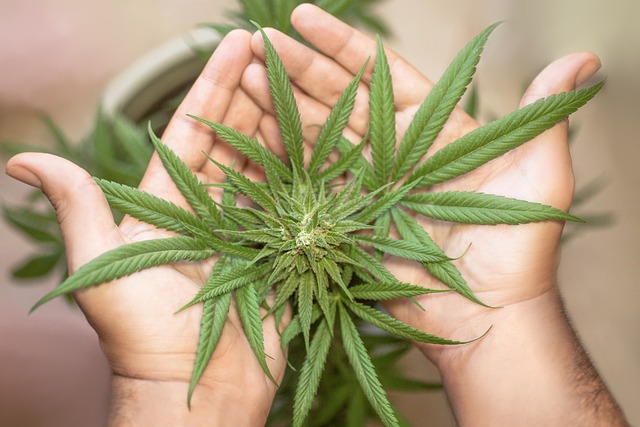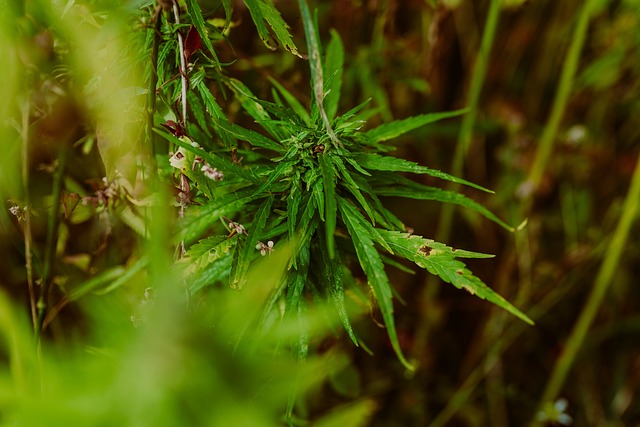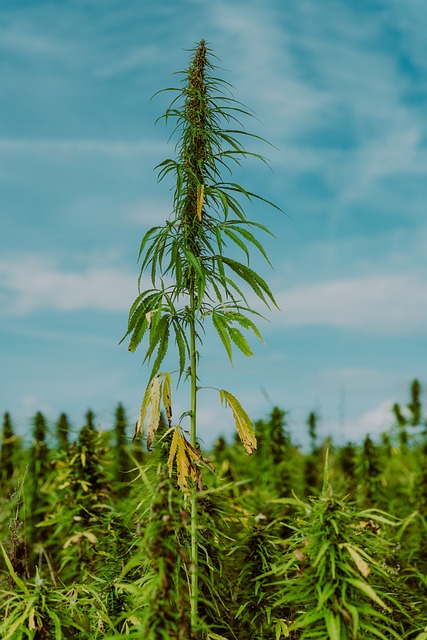Delta-9-tetrahydrocannabinolic acid (THCA), the non-psychoactive precursor of THC found in raw cannabis flowers, offers therapeutic benefits and is gaining attention for its potential health advantages. Unlike THC, THCA doesn’t induce a ‘high’ and is marked by a carboxyl group on its cyclohexene ring. For those interested in the health effects of THCA without psychoactive influence, it’s important to follow THCA flower dosage guidelines, which should be tailored to individual factors, with initial suggestions ranging from 1-5 mg. Due to the strain-specific concentrations and variable responses, using high-quality, lab-tested THCA flower is recommended. Personalized advice from healthcare professionals or cannabis experts can help users navigate precise dosing for a safe and predictable experience. The article emphasizes that while THCA generally causes mild side effects, careful monitoring is crucial when adjusting intake. It’s also important to adhere to local laws and follow safe consumption practices. Users are encouraged to consult with medical professionals before integrating THCA into their health regimen, especially if using it alongside other treatments or medications.
Exploring the complexities of THCA Flower Tincture, this comprehensive article sheds light on its makeup, potential health benefits, and the nuances of safe consumption. From understanding THCA’s role within the cannabis plant to discerning appropriate dosage guidelines, we delve into the multifaceted effects of this non-psychoactive compound. As we navigate through the science behind THCA’s side effects and explore individual variability, we aim to provide a balanced view of its impact, including how it interacts with other substances and medications. With a focus on managing side effects and debunking common dosage myths, this piece also emphasizes the importance of consulting healthcare professionals before use. Additionally, we examine legal considerations, proper storage methods, and alternative uses for THCA Flower Tinctures, all while considering the future of research and regulation in this area. Join us as we unravel the potential of THCA flower, ensuring informed consumption for those interested in its diverse applications.
Understanding THCA Flower and Its Composition

Delta-9-tetrahydrocannabinolic acid (THCA) is the non-psychoactive precursor to the well-known compound delta-9-tetrahydrocannabinol (THC). Found abundantly in raw cannabis flowers, THCA possesses a unique composition that includes a carboxyl group at the R1 position of the cyclohexene ring, which differentiates it from its psychoactive counterpart, THC. This distinction is significant as it affects the compound’s interactions with the endocannabinoid system within the human body. When cannabis is heated or decarboxylated, THCA converts to THC, leading to the psychotropic effects commonly associated with cannabis consumption.
Understanding the composition of THCA flower is crucial for consumers who wish to utilize its potential benefits without the psychoactive effects. THCA is known for its therapeutic properties, which include anti-inflammatory and analgesic effects, without the ‘high’ typically associated with cannabis use. The recommended dosage guidelines for THCA flower are highly individualized, based on factors such as body weight, tolerance, and desired effects. Typically, users may start with a small dose of THCA flower, ranging from 1-5 mg, assessing their response before considering an increase. It’s advisable to consult healthcare professionals or experienced cannabis practitioners for personalized dosage advice. Additionally, users should be aware that the effects of THCA can vary widely depending on the strain and its specific concentration of THCA. Therefore, it’s important to source high-quality, lab-tested THCA flower to ensure a safe and consistent experience.
The Role of THCA in the Cannabis Plant

The tetrahydrocannabinolic acid, or THCA, is a non-psychoactive compound found in the cannabis plant that has garnered attention for its potential therapeutic properties. As a precursor to the more well-known psychoactive substance THC, THCA is present in raw cannabis flowers and is converted into THC when the flower is heated, such as through smoking or vaporizing. Research suggests that THCA may offer a range of benefits including anti-inflammatory, neuroprotective, and anti-nausea effects without the psychoactive side effects associated with its decarboxylated form.
When considering THCA flower dosage guidelines, it is crucial to approach its use with caution and respect for individual sensitivity. Unlike THC, THCA’s impact on the body can vary widely among users, and there is a lack of standardized dosing due to the relatively recent exploration of its effects. Users are advised to start with low doses to gauge their response and gradually increase the amount as needed while monitoring their reactions. It is also important to note that THCA flower side effects are generally mild at low doses, but can include sedation, dry mouth, and mild anxiety in some individuals, especially at higher dosages. As with any substance from the cannabis plant, it is recommended to consult with a healthcare professional before incorporating THCA into one’s health regimen, particularly if combining with other medications or treatments. Adhering to local laws and regulations regarding cannabis use is also imperative.
In conclusion, thorough understanding of THCA flower’s composition and role within the cannabis plant is pivotal for safe consumption. Users should adhere strictly to THCA flower dosage guidelines to mitigate potential side effects. As with any substance, individual responses to THCA can vary significantly, emphasizing the importance of moderation and personalized usage patterns. With the growing body of research on THCA, it is clear that this non-psychoactive compound holds promise for various health applications. However, more studies are needed to fully understand its effects and ensure safe and effective use. Users are advised to approach THCA flower with caution, considering individual health conditions and local regulations, and to consult healthcare professionals when necessary. By doing so, one can navigate the benefits of THCA without exposing themselves to unwanted side effects.
